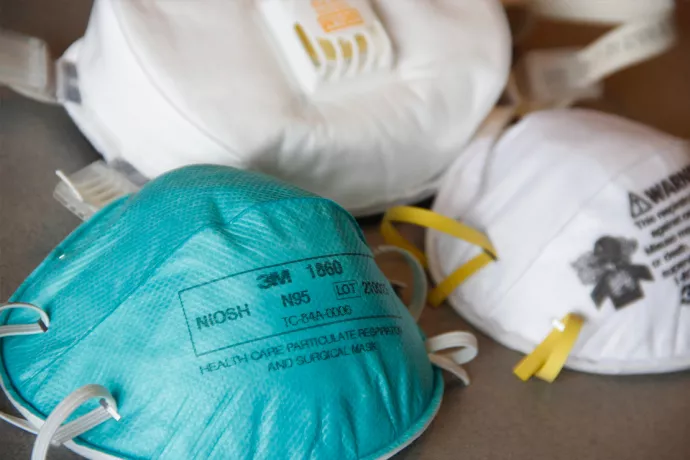
UTM rallies to help medical community during COVID-19 crisis
When U of T Mississauga staffer Harry Zhou put in an order for surgical masks back in January, little did he know his forethought would go on to spearhead a multi-departmental donation to frontline health-care workers in Mississauga hospitals. But that is precisely what happened this past week.
“We knew the hospitals had a shortage of personal protective equipment (PPE) like masks,” says Zhou, business manager for Political Science and Language Studies.
“Our departments decided the masks we had ordered for our faculty, staff and students in preparation for a breakout of the virus here in Canada would be more useful to the frontline heroes at the hospital because we definitely need to protect and support them.”
Zhou dropped off the donation of 150 new surgical masks to Trillium Health Partners along with a thank you card signed by several members from both departments.
“I think the thank you card is just as important” says Zhou. “We wanted to encourage and thank our heroes, our doctors and nurses, in a personal way.”
In addition to the donation of masks, Zhou said Language Studies Assistant Professor Liz Coulson used a 3D printer with her son to produce some face shields to protect frontline health-care workers.
Meanwhile, in response to a call for critical COVID-19 supplies from the vice-principal of research and innovation at U of T’s St. George campus, the Department of Chemical and Physical Sciences has donated 5,200 pairs of gloves from their chemistry labs, and the Department of Biology is donating gowns, over 60 surgical and N95 masks, and more than 30,000 gloves from teaching labs as well as several research labs.
The Academic Machine Shop has already produced sneeze barriers for Student Services and are on standby to help with any resources that may be required on campus and to compensate for any repair services that might not be readily available.
“I am buoyed and encouraged to see the efforts and creativity of our UTM community and researchers, and the ways in which people have come together to do what they can in this time of need,” says Professor Kent Moore, vice-principal of research.
“We will continue to look for ways that we can support frontline health-care workers, as well as assist the science and medical researchers in their various endeavours during this crisis.”
